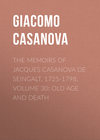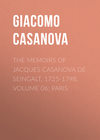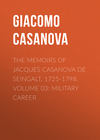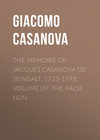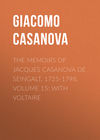Czytaj książkę: «The Memoirs of Jacques Casanova de Seingalt, 1725-1798. Volume 23: English», strona 3
"Come back in a quarter of an hour; she has been ordered a bath, and is just going to take it."
"This is another imposture. You're as bad a liar as she is."
"You are cruel and unjust, and if you will promise to be discreet, I will take you up to the third floor where she is bathing."
"Very good; take me." She went upstairs, I following on tiptoe, and pushed me into a room, and shut the door upon me. The Charpillon was in a huge bath, with her head towards the door, and the infernal coquette, pretending to think it was her aunt, did not move, and said,—
"Give me the towels, aunt."
She was in the most seductive posture, and I had the pleasure of gazing on her exquisite proportions, hardly veiled by the water.
When she caught sight of me, or rather pretended to do so, she gave a shriek, huddled her limbs together, and said, with affected anger,—
"Begone!"
"You needn't exert your voice, for I am not going to be duped."
"Begone!"
"Not so, give me a little time to collect myself."
"I tell you, go!"
"Calm yourself, and don't be afraid of my skewing you any violence; that would suit your game too well."
"My aunt shall pay dearly for this."
"She will find me her friend. I won't touch you, so shew me a little more of your charms."
"More of my charms?"
"Yes; put yourself as you were when I came in."
"Certainly not. Leave the room."
"I have told you I am not going, and that you need not fear for your . . . . well, for your virginity, we will say."
She then shewed me a picture more seductive than the first, and pretending kindliness, said,—
"Please, leave me; I will not fail to shew my gratitude."
Seeing that she got nothing, that I refrained from touching her, and that the fire she had kindled was in a fair way to be put out, she turned her back to me to give me to understand that it was no pleasure to her to look at me. However, my passions were running high, and I had to have recourse to self-abuse to calm my senses, and was glad to find myself relieved, as this proved to me that the desire went no deeper than the senses.
The aunt came in just as I had finished, and I went out without a word, well pleased to find myself despising a character wherein profit and loss usurped the place of feeling.
The aunt came to me as I was going out of the house, and after enquiring if I were satisfied begged me to come into the parlour.
"Yes," said I, "I am perfectly satisfied to know you and your niece. Here is the reward."
With these words I drew a bank-note for a hundred pounds from my pocket-book, and was foolish enough to give it her, telling her that she could make her balm, and need not trouble to give me any document as I knew if would be of no value. I had not the strength to go away without giving her anything, and the procuress was sharp enough to know it.
When I got home I reflected on what had happened, and pronounced myself the conqueror with great triumph. I felt well at ease, and felt sure that I should never set foot in that house again. There were seven of them altogether, including servants, and the need of subsisting made them do anything for a living; and when they found themselves obliged to make use of men, they summoned the three rascals I have named, who were equally dependent on them.
Five or six days afterwards, I met the little hussy at Vauxhall in company with Goudar. I avoided her at first, but she came up to me reproaching me for my rudeness. I replied coolly enough, but affecting not to notice my manner, she asked me to come into an arbour with her and take a cup of tea.
"No, thank you," I replied, "I prefer supper."
"Then I will take some too, and you will give it me, won't you, just to shew that you bear no malice?"
I ordered supper for four and we sat down together as if we had been intimate friends.
Her charming conversation combined with her beauty gradually drew me under her charm, and as the drink began to exercise its influence over me, I proposed a turn in one of the dark walks, expressing a hope that I should fare better than Lord Pembroke. She said gently, and with an appearance of sincerity that deceived me, that she wanted to be mine, but by day and on the condition that I would come and see her every day.
"I will do so, but first give me one little proof of your love."
"Most certainly not."
I got up to pay the bill, and then I left without a word, refusing to take her home. I went home by myself and went to bed.
The first thought when I awoke was that I was glad she had not taken me at my word; I felt very strongly that it was to my interest to break off all connection between that creature and myself. I felt the strength of her influence over me, and that my only way was to keep away from her, or to renounce all pretension to the possession of her charms.
The latter plan seemed to me impossible, so I determined to adhere to the first; but the wretched woman had resolved to defeat all my plans. The manner in which she succeeded must have been the result of a council of the whole society.
A few days after the Vauxhall supper Goudar called on me, and began by congratulating me on my resolution not to visit the Ansperghers any more, "for," said he, "the girl would have made you more and more in love with her, and in the end she would have seduced you to beggary."
"You must think me a great fool. If I had found her kind I should have been grateful, but without squandering all my money; and if she had been cruel, instead of ridiculous, I might have given her what I have already given her every day, without reducing myself to beggary."
"I congratulate you; it shews that you are well off. But have you made up your mind not to see her again?"
"Certainly."
"Then you are not in love with her?"
"I have been in love, but I am so no longer; and in a few days she will have passed completely out of my memory. I had almost forgotten her when I met her with you at Vauxhall."
"You are not cured. The way to be cured of an amour does not lie in flight, when the two parties live in the same town. Meetings will happen, and all the trouble has to be taken over again."
"Then do you know a better way?"
"Certainly; you should satiate yourself. It is quite possible that the creature is not in love with you, but you are rich and she has nothing. You might have had her for so much, and you could have left her when you found her to be unworthy of your constancy. You must know what kind of a woman she is."
"I should have tried this method gladly, but I found her out."
"You could have got the best of her, though, if you had gone to work in the proper way. You should never have paid in advance. I know everything."
"What do you mean?"
"I know she has cost you a hundred guineas, and that you have not won so much as a kiss from her. Why, my dear sir, you might have had her comfortably in your own bed for as much! She boasts that she took you in, though you pride yourself on your craft."
"It was an act of charity towards her aunt."
"Yes, to make her Balm of Life; but you know if it had not been for the niece the aunt would never have had the money."
"Perhaps not, but how come you who are of their party to be talking to me in this fashion?"
"I swear to you I only speak out of friendship for you, and I will tell you how I came to make the acquaintance of the girl, her mother, her grandmother and her two aunts, and then you will no longer consider me as of their party.
"Sixteen months ago I saw M. Morosini walking about Vauxhall by himself. He had just come to England to congratulate the king on his accession to the throne, on behalf of the Republic of Venice. I saw how enchanted he was with the London beauties, and I went up to him and told him that all these beauties were at his service. This made him laugh, and on my repeating that it was not a jest he pointed out one of the girls, and asked if she would be at his service. I did not know her, so I asked him to wait awhile, and I would bring him the information he required. There was no time to be lost, and I could see that the girl was not a vestal virgin, so I went up to her and told her that the Venetian ambassador was amorous of her, and that I would take her to him if she would receive his visits. The aunt said that a nobleman of such an exalted rank could only bring honour to her niece. I took their address, and on my way back to the ambassador I met a friend of mine who is learned in such commodities, and after I had shewed him the address he told me it was the Charpillon."
"And it was she?"
"It was. My friend told me she was a young Swiss girl who was not yet in the general market, but who would soon be there, as she was not rich, and had a numerous train to support.
"I rejoined the Venetian, and told him that his business was done, and asked him at what time I should introduce him the next day, warning him that as she had a mother and aunts she would not be alone.
"'I am glad to hear it,' said he, 'and also that she is not a common woman.' He gave me an appointment for the next day, and we parted.
"I told the ladies at what hour I should have the pleasure of introducing the great man to them, and after warning them that they must appear not to know him I went home.
"The following day I called on M. de Morosini, and took him to Denmark Street incognito. We spent an hour in conversation, and then went away without anything being settled. On the way back the ambassador told me that he should like to have the girl on conditions which he would give me in writing at his residence.
"These conditions were that she should live in a furnished house free of rent, without any companion, and without receiving any visitors. His excellency would give her fifty guineas a month, and pay for supper whenever he came and spent the night with her. He told me to get the house if his conditions were received. The mother was to sign the agreement.
"The ambassador was in a hurry, and in three days the agreement was signed; but I obtained a document from the mother promising to let me have the girl for one night as soon as the Venetian had gone; it was known he was only stopping in London for a year."
Goudar extracted the document in question from his pocket, and gave it to me. I read it and re-read it with as much surprise as pleasure, and he then proceeded with his story.
"When the ambassador had gone, the Charpillon, finding herself at liberty once more, had Lord Baltimore, Lord Grosvenor, and M. de Saa, the Portuguese ambassador, in turn, but no titular lover. I insisted on having my night with her according to agreement, but both mother and daughter laughed at me when I spoke of it. I cannot arrest her, because she is a minor, but I will have the mother imprisoned on the first opportunity, and you will see how the town will laugh. Now you know why I go to their house; and I assure you you are wrong if you think I have any part in their councils. Nevertheless, I know they are discussing how they may catch you, and they will do so if you do not take care."
"Tell the mother that I have another hundred guineas at her service if she will let me have her daughter for a single night."
"Do you mean that?"
"Assuredly, but I am not going to pay in advance."
"That's the only way not to be duped. I shall be glad to execute your commission."
I kept the rogue to dinner, thinking he might be useful to me. He knew everything and everybody, and told me a number of amusing anecdotes. Although a good-for-nothing fellow, he had his merits. He had written several works, which, though badly constructed, shewed he was a man of some wit. He was then writing his "Chinese Spy," and every day he wrote five or six news-letters from the various coffee-houses he frequented. I wrote one or two letters for him, with which he was much pleased. The reader will see how I met him again at Naples some years later.
The next morning, what was my surprise to see the Charpillon, who said with an air that I should have taken for modesty in any other woman,—
"I don't want you to give me any breakfast, I want an explanation, and to introduce Miss Lorenzi to you."
I bowed to her and to her companion, and then said,—
"What explanation do you require?"
At this, Miss Lorenzi, whom I had never seen before, thought proper to leave us, and I told my man that I was not at home to anybody. I ordered breakfast to be served to the companion of the nymph, that she might not find the waiting tedious.
"Sir," said the Charpillon, "is it a fact that you charged the Chevalier Goudar to tell my mother that you would give a hundred guineas to spend the night with me?"
"No, not to spend a night with you, but after I had passed it. Isn't the price enough?"
"No jesting, sir, if you please. There is no question of bargaining; all I want to know is whether you think you have a right to insult me, and that I am going to bear it?"
"If you think yourself insulted, I may, perhaps, confess I was wrong; but I confess I did not think I should have to listen to any reproaches from you. Gondar is one of your intimate friends, and this is not the first proposal he has taken to you. I could not address you directly, as I know your arts only too well."
"I shall not pay any attention to your abuse of my self; I will only remind you of what I said 'that neither money nor violence were of any use,' and that your only way was to make me in love with you by gentle means. Shew me where I have broken my word! It is you that have foresworn yourself in coming into my bath-room, and in sending such a brutal message to my mother. No one but a rascal like Goudar would have dared to take such a message."
"Goudar a rascal, is he? Well, he is your best friend. You know he is in love with you, and that he only got you for the ambassador in the hope of enjoying you himself. The document in his possession proves that you have behaved badly towards him. You are in his debt, discharge it, and then call him a rascal if you have the conscience to do so. You need not trouble to weep, for I knew the source of those tears; it is defiled."
"You know nothing of it. I love you, and it is hard to have you treat me so."
"You love me? You have not taken the best way to prove it!"
"As good a way as yours. You have behaved to me as if I were the vilest of prostitutes, and yesterday you seemed to think I was a brute beast, the slave of my mother. You should have written to me in person, and without the intervention of so vile an agent; I should have replied in the same way, and you need not have been afraid that you would be deceived."
"Supposing I had written, what would your answer have been?"
"I should have put all money matters out of question. I should have promised to content you on the condition that you would come and court me for a fortnight without demanding the slightest favour. We should have lived a pleasant life; we should have gone to the theatre and to the parks. I should have become madly in love with you. Then I should have given myself up to you for love, and nothing but love. I am ashamed to say that hitherto I have only given myself out of mere complaisance. Unhappy woman that I am! but I think nature meant me to love, and I thought when I saw you that my happy star had sent you to England that I might know the bliss of true affection. Instead of this you have only made me unhappy. You are the first man that has seen me weep; you have troubled my peace at home, for my mother shall never have the sum you promised her were it for nothing but a kiss."
"I am sorry to have injured you, though I did not intend to do so; but I really don't know what I can do."
"Come and see us, and keep your money, which I despise. If you love me, come and conquer me like a reasonable and not a brutal lover; and I will help you, for now you cannot doubt that I love you."
All this seemed so natural to me that I never dreamed it contained a trap. I was caught, and I promised to do what she wished, but only for a fortnight. She confirmed her promise, and her countenance became once more serene and calm. The Charpillon was a born actress.
She got up to go, and on my begging a kiss as a pledge of our reconciliation she replied, with a smile, the charm of which she well knew, that it would not do to begin by breaking the term of our agreement, and she left me more in love than ever, and full of repentance for my conduct.
CHAPTER XII
Goudar's Chair
If she had written all this to me instead of coming and delivering it viva voce, it would probably have produced no effect; there would have been no tears, no ravishing features. She probably calculated all this, for women have a wonderful instinct in these matters.
That very evening I began my visits, and judged from my welcome that my triumph was nigh at hand. But love fills our minds with idle visions, and draws a veil over the truth.
The fortnight went by without my even kissing her hand, and every time I came I brought some expensive gift, which seemed cheap to me when I obtained such smiles of gratitude in exchange. Besides these presents, not a day passed without some excursion to the country or party at the theatre; that fortnight must have cost me four hundred guineas at the least.
At last it came to an end, and I asked her in the presence of her mother where she would spend the night with me, there or at my house. The mother said that we would settle it after supper, and I made no objection, not liking to tell her that in my house the supper would be more succulent, and a better prelude for the kind of exercise I expected to enjoy.
When we had supped the mother took me aside, and asked me to leave with the company and then to come back. I obeyed, laughing to myself at this foolish mystery, and when I came back I found the mother and the daughter in the parlour, in which a bed had been laid on the floor.
Though I did not much care for this arrangement, I was too amorous to raise any objection at a moment when I thought my triumph was at hand; but I was astonished when the mother asked me if I would like to pay the hundred guineas in advance.
"Oh, fie!" exclaimed the girl; and her mother left the room, and we locked the door.
My amorous feelings, so long pent up within my breast, would soon find relief. I approached her with open arms; but she avoided my caress, and gently begged me to get into bed while she prepared to follow me. I watched her undress with delight, but when she had finished she put out the candles. I complained of this act of hers, but she said she could not sleep with the light shining on her. I began to suspect that I might have some difficulties thrown in my way to sharpen the pleasure, but I determined to be resigned and to overcome them all.
When I felt her in the bed I tried to clasp her in my arms, but found that she had wrapped herself up in her long night-gown; her arms were crossed, and her head buried in her chest. I entreated, scolded, cursed, but all in vain; she let me go on, and answered not a word.
At first I thought it was a joke, but I soon found out my mistake; the veil fell from my eyes and I saw myself in my true colours, the degraded dupe of a vile prostitute.
Love easily becomes fury. I began to handle her roughly, but she resisted and did not speak. I tore her night-gown to rags, but I could not tear it entirely off her. My rage grew terrible, my hands became talons, and I treated her with the utmost cruelty; but all for nothing. At last, with my hand on her throat, I felt tempted to strangle her; and then I knew it was time for me to go.
It was a dreadful night. I spoke to this monster of a woman in every manner and tone-with gentleness, with argument, rage, remonstrance, prayers, tears, and abuse, but she resisted me for three hours without abandoning her painful position, in spite of the torments I made her endure.
At three o'clock in the morning, feeling my mind and body in a state of exhaustion, I got up and dressed myself by my sense of touch. I opened the parlour door, and finding the street door locked I shook it till a servant came and let me out. I went home and got into bed, but excited nature refused me the sleep I needed so. I took a cup of chocolate, but it would not stay on my stomach, and soon after a shivering fit warned me that I was feverish. I continued to be ill till the next day, and then the fever left me in a state of complete exhaustion.
As I was obliged to keep to my bed for a few days, I knew that I should soon get my health again; but my chief consolation was that at last I was cured. My shame had made me hate myself.
When I felt the fever coming on I told my man not to let anybody come to see me, and to place all my letters in my desk; for I wanted to be perfectly well before I troubled myself with anything.
On the fourth day I was better, and I told Jarbe to give me my letters. I found one from Pauline, dated from Madrid, in which she informed me that Clairmont had saved her life while they were fording a river, and she had determined to keep him till she got to Lisbon, and would then send him back by sea. I congratulated myself at the time on her resolve; but it was a fatal one for Clairmont, and indirectly for me also. Four months after, I heard that the ship in which he had sailed had been wrecked, and as I never heard from him again I could only conclude that my faithful servant had perished amidst the waves.
Amongst my London letters I found two from the infamous mother of the infamous Charpillon, and one from the girl herself. The first of the mother's letters, written before I was ill, told me that her daughter was ill in bed, covered with bruises from the blows I had given her, so that she would be obliged to institute legal proceedings against me. In the second letter she said she had heard I too was ill, and that she was sorry to hear it, her daughter having informed her that I had some reason for my anger; however, she would not fail to justify herself on the first opportunity. The Charpillon said in her letter that she knew she had done wrong, and that she wondered I had not killed her when I took her by the throat. She added that no doubt I had made up my mind to visit her no more, but she hoped I would allow her one interview as she had an important communication to make to me. There was also a note from Goudar, saying that he wanted to speak to me, and that he would come at noon. I gave orders that he should be admitted.
This curious individual began by astonishing me; he told me the whole story of what had taken place, the mother having been his informant.
"The Charpillon," he added, "has not got a fever, but is covered with bruises. What grieves the old woman most is that she has not got the hundred guineas."
"She would have had them the next morning," I said, "if her daughter had been tractable."
"Her mother had made her swear that she would not be tractable, and you need not hope to possess her without the mother's consent."
"Why won't she consent?"
"Because she thinks that you will abandon the girl as soon as you have enjoyed her."
"Possibly, but she would have received many valuable presents, and now she is abandoned and has nothing."
"Have you made up your mind not to have anything more to do with her?"
"Quite."
"That's your wisest plan, and I advise you to keep to it, nevertheless I want to shew you something which will surprise you. I will be back in a moment."
He returned, followed by a porter, who carried up an arm-chair covered with a cloth. As soon as we were alone, Goudar took off the covering and asked me if I would buy it.
"What should I do with it? It is not a very attractive piece of furniture."
"Nevertheless, the price of it is a hundred guineas."
"I would not give three."
"This arm-chair has five springs, which come into play all at once as soon as anyone sits down in it. Two springs catch the two arms and hold them tightly, two others separate the legs, and the fifth lifts up the seat."
After this description Goudar sat down quite naturally in the chair and the springs came into play and forced him into the position of a woman in labour.
"Get the fair Charpillon to sit in this chair," said he, "and your business is done."
I could not help laughing at the contrivance, which struck me as at once ingenious and diabolical, but I could not make up my mind to avail myself of it.
"I won't buy it," said I, "but I shall be obliged if you will leave it here till to-morrow."
"I can't leave it here an hour unless you will buy it; the owner is waiting close by to hear your answer."
"Then take it away and come back to dinner."
He shewed me how I was to release him from his ridiculous position, and then after covering it up again he called the porter and went away.
There could be no doubt as to the action of the machinery, and it was no feeling of avarice which hindered me from buying the chair. As I have said, it seemed rather a diabolical idea, and besides it might easily have sent me to the gallows. Furthermore, I should never have had the strength of mind to enjoy the Charpillon forcibly, especially by means of the wonderful chair, the mechanism of which would have frightened her out of her wits.
At dinner I told Goudar that the Charpillon had demanded an interview, and that I had wished to keep the chair so as to shew her that I could have her if I liked. I shewed him the letter, and he advised me to accede to her request, if only for curiosity's sake.
I was in no hurry to see the creature while the marks on her face and neck were still fresh, so I spent seven or eight days without making up my mind to receive her. Goudar came every day, and told me of the confabulations of these women who had made up their minds not to live save by trickery.
He told me that the grandmother had taken the name of Anspergher without having any right to it, as she was merely the mistress of a worthy citizen of Berne, by whom she had four daughters; the mother of the Charpillon was the youngest of the family, and, as she was pretty and loose in her morals, the Government had exiled her with her mother and sisters. They had then betaken themselves to Franche-Comte, where they lived for some time on the Balm of Life. Here it was that the Charpillon came into the world, her mother attributing her to a Count de Boulainvilliers. The child grew up pretty, and the family removed to Paris under the impression that it would be the best market for such a commodity, but in the course of four years the income from the Balm having dwindled greatly, the Charpillon being still too young to be profitable, and debtors closing round them on every side, they resolved to come to London.












